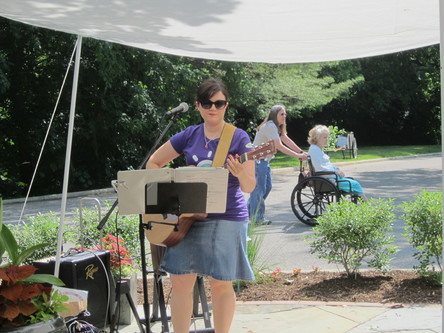How Music Aids Alzheimer’s and Dementia Therapy

Have an elder family member or friend receiving care for dementia or Alzheimer’s? Interested in learning about creative therapies which complement the medical treatments for these conditions?
Facilities like Hillside Terrace that specialize in elderly care in Ann Arbor have seen the benefits of introducing music therapy in various ways. The Alzheimer’s Foundation of America reports that participation in making music or simply listening can minimize stress, help manage emotion, facilitate memory and focus, and promote engagement.
Because our responses to music or based on its rhythmic qualities or have been well-rehearsed, they take little cognitive processing. This means that elders in even very late stages of Alzheimer’s and dementia can still reap the rewards of music therapy, sometimes with amazing results.
Below are several possible ways to implement music therapy.
Manage Emotions
As a disease like dementia progresses, sufferers can find it difficult to manage emotions as communication becomes a challenge and stimuli can be easily overwhelming. As this happens, agitation can easily take control, but music helps. By offering something comforting to focus on, playing or listening to music in their care facility helps seniors escape the stresses of their condition and relax.
Promote Engagement
As elders begin to withdraw with the progression of their disease, helping them pick music they want to listen to can promote their engagement and participation in activities or with family members when they visit.
Stimulate Memory
Either selecting hit music from a senior’s youth (usually from the years they were 18-25 years old) or allowing them to pick songs to listen to can help stimulate memory. Some songs may be strongly linked to a memory or specific time in their life, and listening to it can help focus the mind on these memories.
Facilitate Expression
As it becomes more difficult for a senior with dementia or Alzheimer’s to communicate, the ability to express love and affection also subsides, which is painful for the senior and their loved ones. To combat this, facilities can play music which complements this type of emotion. As the rehearsed response to this kind of music takes over, seniors may find it easier to express affection through hugs, kisses, and singing.
Complement Routine
To complement daily routines, caregivers can select pieces of music with stimulating qualities and those with sedative qualities. During the day when seniors need to be roused for an activity like meals or bathing, stimulating music can be an excellent assistant. Likewise, at quiet times of the day, or times when a senior tends to become agitated, sedative music can be a great help.
With a variety of applications and effects, music therapy can bring joy and tranquility to seniors struggling with Alzheimer’s and dementia. Its many possibilities also make music therapy easy to integrate into the day.
If you have questions about music therapy or providing elderly care in Ann Arbor, please give us a call. We’re confident you’ll see the difference in quality of care when our family shares life with yours. Schedule a tour of our facilities today.







